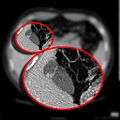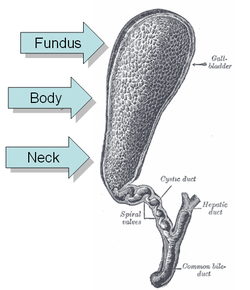Phrygian cap (anatomy)
In medicine, a Phrygian cap is the folded portion of some gallbladders that resembles the Phrygian cap (a soft conical cap with the top pulled forward, associated in antiquity with the inhabitants of Phrygia, a region of central Anatolia). It is a normal anatomical variant seen in 1-6% of patients. It is caused by a fold in the gallbladder where the gallbladder fundus joins the gallbladder body.[1] Apart from the chance of being mistaken for stones on a sonogram, it has no other medical implications nor does it predispose one to other diseases. However, due to potential decrease in bile flow, it may warrant a preventive removal of the gallbladder.
 CT scan showing a phrygian cap
CT scan showing a phrygian cap

The Phrygian cap results from folding of the gallbladder fundus.
References
- Meilstrup JW, Hopper KD, Thieme GA (December 1991). "Imaging of gallbladder variants". AJR Am J Roentgenol. 157 (6): 1205–8. doi:10.2214/ajr.157.6.1950867. PMID 1950867.
This article is issued from Wikipedia. The text is licensed under Creative Commons - Attribution - Sharealike. Additional terms may apply for the media files.